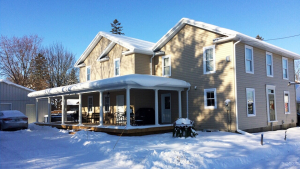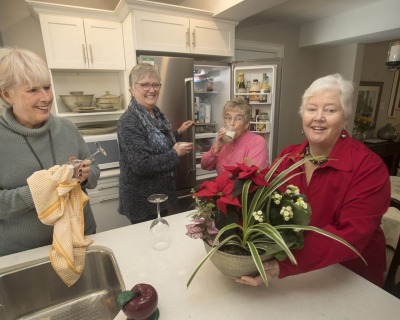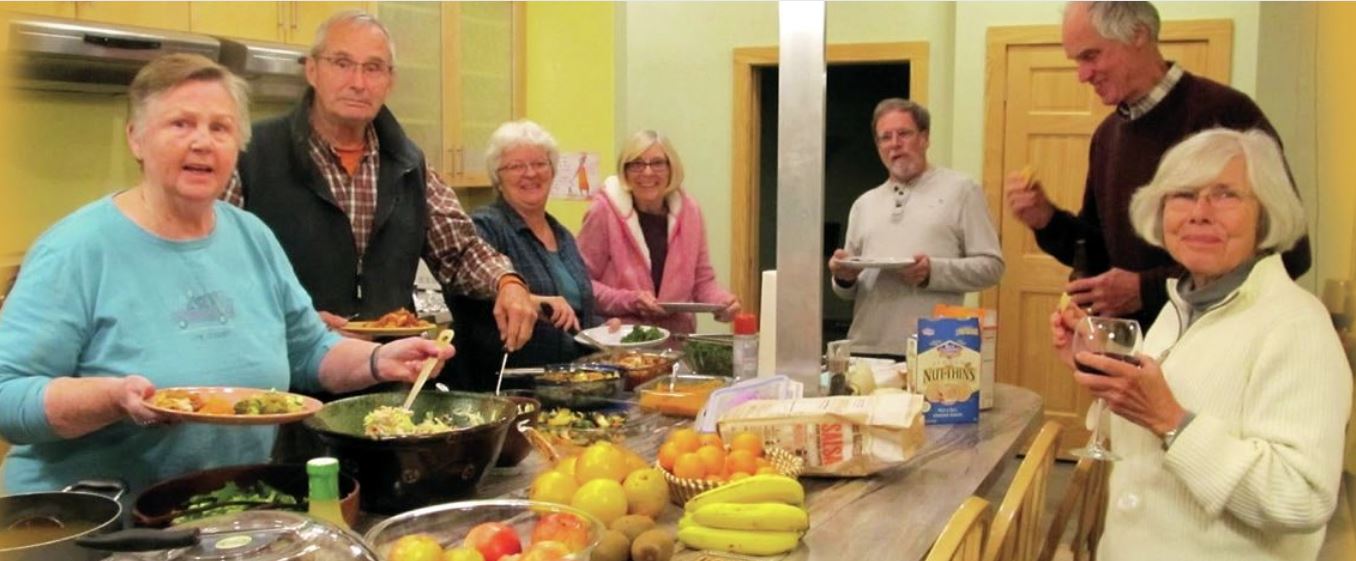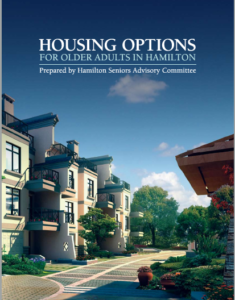For our blogs on Housing, click here.
Models of Alternative Housing
1. CO-OWNERSHIP
 Co-ownership is the purchase of a property by two or more parties who work together to develop a plan, share space and resources, and tailor what it all looks like to meet their needs, e.g. The Golden Girls. In many cases, a house is purchased by the individuals and then renovated to meet their needs.
Co-ownership is the purchase of a property by two or more parties who work together to develop a plan, share space and resources, and tailor what it all looks like to meet their needs, e.g. The Golden Girls. In many cases, a house is purchased by the individuals and then renovated to meet their needs.
The emphasis is on relationships and social connections along with security, mutual support, interdependence and independence. While sharing the cost of utilities, maintenance and repairs, housekeeping, insurance and taxes, housemates have their own private suite along with shared living, dining and kitchen space. Each individual has an undivided interest in the property and participates in the planning and decision-making so that the result is geared to the group’s wants and needs. In a co-ownership arrangement, individuals buy a portion or percentage of real property and share the title with the other purchaser(s).
As tenants-in-common, owners have a clear sense of knowing what percentage of the property a particular owner controls. Co-owned properties are not governed by legislation such as the Co-operative Corporations Act or the Condominium Act. While communication, cooperation and compromise are key, other elements that make this form of housing work are outlined in a co-ownership agreement. Co-ownership agreements define a wide range of terms that govern the relationship between co-owners, including the financing, mortgages, insurance, co-owner responsibilities and liabilities, rules and boundaries and dispute resolution mechanisms. Not just for seniors, this type of housing can work for any age group, including intergenerational.

Port Perry Golden Girls
More than 30 years after that show first aired in 1985, the so-called Golden Girls of Port Perry – four seniors who knew living alone or in a retirement home just wasn’t for them for financial and other reasons – overcame municipal bylaws to purchase a house together. The four women in their late 60s and early 70s live under one roof in a 3,400 square foot home. Each maintains a spacious private bedroom with ensuite and shares communal dining, living room and kitchen. Their downtown heritage home has been renovated to include accessibility features and a suite for a live-in caregiver if required.
The arrangement that makes so much sense would never have been possible at one time in the Township of Scugog because of objections by local politicians. First-term Durham MPP Lindsey Park says that kind of opposition to affordable housing solutions for seniors can’t happen again and she introduced a private members’ bill called the Golden Girls Act.
Golden Girls Act, 2019
All levels of government should recognize that Ontario has an aging population and should encourage innovative and affordable housing solutions for seniors. Local municipalities should not deter seniors from choosing affordable housing options and should recognize that unrelated seniors living together can reap significant health, economic and social benefits. It is desirable to provide clarity to municipalities that the Planning Act should be interpreted in a way that encourages and permits home sharing by unrelated seniors as a housing solution.
2. HOMESHARE
 HomeSharing is a viable housing alternative for those who want to remain in their home and are willing to share some common space like living, dining, kitchen and laundry. Each HomeShare is negotiated to support the needs of both the home sharer and the home seeker. This model of living also offers older homeowners relief from social isolation and the benefits of interdependence and mutual support.
HomeSharing is a viable housing alternative for those who want to remain in their home and are willing to share some common space like living, dining, kitchen and laundry. Each HomeShare is negotiated to support the needs of both the home sharer and the home seeker. This model of living also offers older homeowners relief from social isolation and the benefits of interdependence and mutual support.
HomeShare’s purpose is twofold:
- To increase the options for older and Vulnerable Sector people to remain at home with independence and dignity, while fostering intergenerational/interpersonal understanding
- To provide an affordable housing option for Home Seekers
The HomeShare program is founded on the belief that Older and Vulnerable Sector people have a right to remain in their own home should they wish to do so, living with as much autonomy and independence as they wish, and the community’s service system should assist them to achieve this.
HomeShare programs are diverse in terms of how they operate. Some are run by charities or other not-for-profit agencies, while others are businesses.
HomeSharing for older people:
Many older people who live alone find that family and friends are too far away to give the help, companionship and security they need. Some may find it a struggle to maintain their independence at home, yet do not want to move into alternative accommodation such as a care home. Even if they can survive alone, they may want a better quality of life in their own homes. The needs of older people vary, but some of the most common include:
- help with household tasks such as cooking, shopping, cleaning, gardening, and caring for pets
- companionship and friendship
- personal care – for those who are more dependent
- security – for example having someone in the house at night
- an additional source of income
Because each HomeShare match is unique and personal to those involved, there are often hidden benefits where both parties gain much more than they expected.
OPTIONS FOR HOMESHARING IN HAMILTON-BURLINGTON
A. HomeShare Alliance
 HomeShare Alliance aims to create a cultural shift in the real estate and housing markets, one that shines a light on the benefits of sharing rather than selling one’s home. Guiding homeowners through the process of becoming HomeShare hosts and by listening to the needs, concerns and goals of both parties, HomeShare Alliance is committed to finding not just any housemate, but the right housemate for each unique lifestyle.
HomeShare Alliance aims to create a cultural shift in the real estate and housing markets, one that shines a light on the benefits of sharing rather than selling one’s home. Guiding homeowners through the process of becoming HomeShare hosts and by listening to the needs, concerns and goals of both parties, HomeShare Alliance is committed to finding not just any housemate, but the right housemate for each unique lifestyle.
For more information, contact:
Tara McEwen (Homeshare Director) HomeShare Alliance
5063 North Service Rd Suite 100
Burlington ON L7L 5H6
905-973-9854 Email: [email protected]
B. The Halton HomeShare Program

This is a partnership between Halton Region, Halton Housing Help, and Burlington Age-Friendly Council. Currently being offered throughout Halton, this program works to match older adults with renters who can help with household responsibilities. Halton Housing Help screens applicants and provides follow-up monitoring services.
The HomeShare Toolkit is a useful guide in determining if HomeShare is a good option for you.
For more information contact: Heather Thompson, Manager, Age-Friendly Initiative 855-395-8807 Email: [email protected] Read the article: How Halton seniors sharing space keeps them in their homes
C. McMaster Symbiosis
McMaster University Intergenerational Home Matching

For many seniors with spare rooms in their homes, a common desire is to make better use of that empty space. With McMaster Symbiosis, a co-housing program that matches students and seniors for a mutually beneficial living arrangement, seniors with the extra space can do just that.
McMaster Symbiosis aims to foster “symbiotic” intergenerational relationships between compatible seniors and students in a living arrangement that improves the quality of life for both parties.
Candidates are matched based on compatible profiles of personal preferences and hobbies. Once a compatible match is created, the two parties spend time together to see if the partnership is suitable in real-life. Ensuring the highest quality matches is of utmost importance to McMaster Symbiosis; students are thoroughly vetted to alleviate some qualms seniors may have about inviting a stranger to live in their homes. Personalized contracts are drafted and volunteers with McMaster Symbiosis continue to check-in and offer their support throughout every stage of the partnership.

Why these university students love living with seniors
Tafadzwa Machipisa is a 27-year-old medical student from Zimbabwe studying at McMaster University in Hamilton and living with 73-year-old Constance Jain. They are part of a homesharing program at the university that pairs students with seniors.
D. Golden Girls Canada

Golden Girls Canada facilitates home sharing connections for seniors. Whether someone has a home to share or is looking for a home to live in, this website is a resource to help find possible connections. Golden Girls Canada does not do the actual matching, rather, they provide an opportunity for people to find other like-minded individuals who are also searching for an affordable friendly place to live through senior home sharing. Sharing a living space is economical, environmentally friendly, and reduces the sense of alienation and isolation. They also offer education on the many benefits of home sharing as well as help to avoid possible pitfalls.
For more information contact: Dorothy Mazeau 416-550-4015 Email: [email protected]
3. COOPERATIVES
 The Golden Horseshoe Co-operative Housing Federation
The Golden Horseshoe Co-operative Housing Federation
Housing Co-ops have long been a favourite housing alternative for older Canadians. They offer social connection, security, interdependence and mutual support.
People of all backgrounds, cultures and ages help to maintain the diversity often found in co-ops. Co-ops can usually accommodate people with physical disabilities and special needs and most have no maximum or minimum income levels to qualify. From the outside, a housing co-op looks like any other apartment building or townhouse development. However, a housing co-op is different.
Most co-ops have a waiting list of people who would like to move into the co-op. These lists are usually divided into two categories; people who can pay the full or “market” rent, and people who will need a subsidy. Subsidy (or rent supplement) is money that the government pays to help lower the rents for people with low incomes. Each co-op has an agreement with the government that outlines the amount of money available and who can qualify.
Co-ops are controlled by the residents; there is no outside landlord. Co-op housing offers a home, not an investment. The residents of a housing co-op are members of the co-operative corporation which owns the whole co-op and as such have a voice and a vote in decisions about their housing. The co-op leases each unit to a member household. Members do not own their units.
In a typical Canadian co-op, from one-quarter to three-quarters of households pay a reduced monthly charge based on their income. The others pay the full monthly charge set when the members approve the co-op’s yearly operating budget. Housing co-ops operate as close to cost as possible. The full monthly housing charge rises only as the co-op’s costs increase.
Condominium co-ops are governed by the Co-operative Corporations Act, and not the Condominium Act.
Housing Cooperatives in the Hamilton area, please click here.
905-561-2667 Email: [email protected]
4. ABBEYFIELD CANADA
 Abbeyfield is an Aging in Community model that offers private bed-sitting rooms with communal spaces for dining and visiting. Housing alternatives like Abbeyfield strengthen social connections and encourage mutual support between the residents. Each House is a non-profit, registered charity; with support often undertaken by community volunteers.
Abbeyfield is an Aging in Community model that offers private bed-sitting rooms with communal spaces for dining and visiting. Housing alternatives like Abbeyfield strengthen social connections and encourage mutual support between the residents. Each House is a non-profit, registered charity; with support often undertaken by community volunteers.
The Abbeyfield concept is very simple. Typically, up to fourteen residents of retirement age live in their own private bed-sitting rooms furnished with their own things. The residents share lunch and dinner, plus a self-serve breakfast. Snacks and drinks are also available throughout the day. A House Coordinator attends to the daily running of the house, the shopping and the preparation and serving of meals.
Hamilton does not yet have an Abbeyfield house; however, there are homes in nearby Durham, Caledon and Toronto that can be visited. https://abbeyfield.ca/province/on/
613-237-0713 Email: [email protected]
5. COHOUSING
 Cohousing is a form of intentional community in which people actively create a neighbourhood that combines the autonomy of privately owned individual dwellings with the advantages of shared resources and community living. Co-developed, co-designed and managed by the residents, a cohousing community typically consists of between 10 and 35 dwelling units, plus a large common house for shared meals and activities. The common house might include a commercial kitchen, dining area, comfortable lounge, guest suites, workshop, yoga/exercise room – whatever amenities the owners support.
Cohousing is a form of intentional community in which people actively create a neighbourhood that combines the autonomy of privately owned individual dwellings with the advantages of shared resources and community living. Co-developed, co-designed and managed by the residents, a cohousing community typically consists of between 10 and 35 dwelling units, plus a large common house for shared meals and activities. The common house might include a commercial kitchen, dining area, comfortable lounge, guest suites, workshop, yoga/exercise room – whatever amenities the owners support.
Typically designed to be environmentally friendly, the style of homes can vary from low-rise apartment buildings to townhomes or cottages, all in proximity to the common house – the hub of the community. The individual dwelling units are owned and there is a monthly fee for the common space; residents can do all or some of the maintenance work required. Resources and tools such as lawnmowers, power tools and bicycles, even cars, for example can be shared, thereby reducing the cost to individuals.
Cohousing includes smaller dwellings, collective decision-making and equitable access to the community-owned property. As a result, it provides a supportive social network and sense of community while also allowing for control of one’s life and participation in decision-making, setting policy and property management.
The modern concept of cohousing originated in Denmark in the 1960s, was brought to North America in the 1980s by architects Charles Durrett and Katie McCamant and is currently found throughout the world. In Canada, there are cohousing communities from the east coast to the west coast, each one a unique expression of the people who built them and live in them. As of 2020, most are located in B.C. with 11 completed projects in that province. In Ontario, there are eight cohousing communities in various stages of development with one small cohousing development in Ottawa, Terra Firma, completed.
COHOUSING HAMILTON
 Cohousing Hamilton was founded in early 2020 with the incentive of funding through Hamilton Aging in Community, the dedication of several visionary volunteers and under the guidance of consultants, Cohousing Options Canada.
Cohousing Hamilton was founded in early 2020 with the incentive of funding through Hamilton Aging in Community, the dedication of several visionary volunteers and under the guidance of consultants, Cohousing Options Canada.
City of Hamilton Housing Options for Older Adults in Hamilton
Prepared by The Seniors Advisory Committee
This resource guide provides important information about housing and housing alternatives such as “Home Sharing”, for seniors in Hamilton. It is meant to help seniors to stay in their own home as long they are able, then, as circumstances change, helps them to gather as much information as possible to help better understand their options and assist with decisions about housing.
Some of the contents:
- Co-housing
- Co-operative housing
- Emergency housing
- Garden suites
- Home sharing
- Life lease housing
- Renovating – staying in your current home
- Tips to keep your home safe


